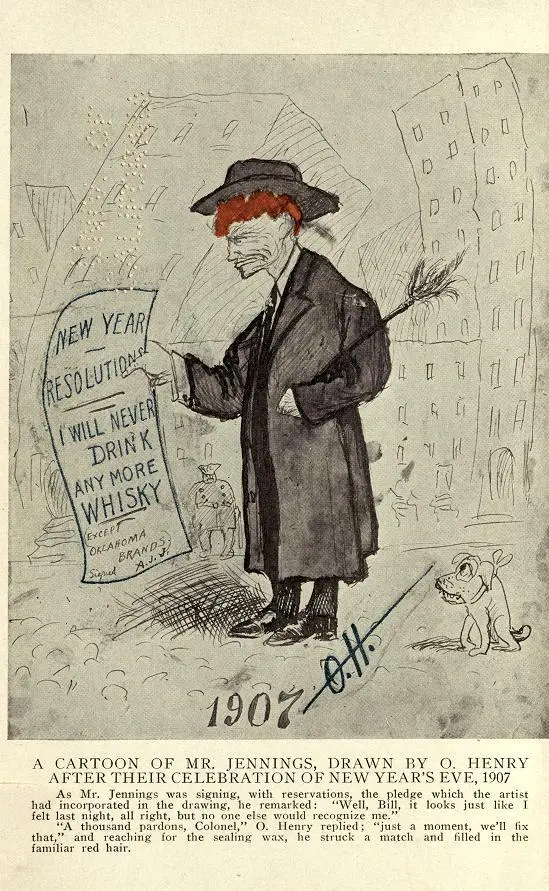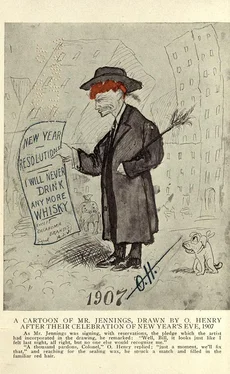Эл Дженнингс - Through the Shadows with O'Henry
Здесь есть возможность читать онлайн «Эл Дженнингс - Through the Shadows with O'Henry» весь текст электронной книги совершенно бесплатно (целиком полную версию без сокращений). В некоторых случаях можно слушать аудио, скачать через торрент в формате fb2 и присутствует краткое содержание. Жанр: Биографии и Мемуары, на английском языке. Описание произведения, (предисловие) а так же отзывы посетителей доступны на портале библиотеки ЛибКат.
- Название:Through the Shadows with O'Henry
- Автор:
- Жанр:
- Год:неизвестен
- ISBN:нет данных
- Рейтинг книги:5 / 5. Голосов: 1
-
Избранное:Добавить в избранное
- Отзывы:
-
Ваша оценка:
- 100
- 1
- 2
- 3
- 4
- 5
Through the Shadows with O'Henry: краткое содержание, описание и аннотация
Предлагаем к чтению аннотацию, описание, краткое содержание или предисловие (зависит от того, что написал сам автор книги «Through the Shadows with O'Henry»). Если вы не нашли необходимую информацию о книге — напишите в комментариях, мы постараемся отыскать её.
Through the Shadows with O'Henry — читать онлайн бесплатно полную книгу (весь текст) целиком
Ниже представлен текст книги, разбитый по страницам. Система сохранения места последней прочитанной страницы, позволяет с удобством читать онлайн бесплатно книгу «Through the Shadows with O'Henry», без необходимости каждый раз заново искать на чём Вы остановились. Поставьте закладку, и сможете в любой момент перейти на страницу, на которой закончили чтение.
Интервал:
Закладка:
THROUGH THE SHADOWS WITH O. HENRY
BY
AL JENNINGS,
AUTHOR OF "BEATING BACK"
TO MY DEAR FRIEND FREMONT OLDER
EDITOR "SAN FRANCISCO CALL"
In giving this volume to the public I am indebted to you, without whose aid and encouragement the book would never have been written. To you again are due my thanks for furnishing the valued assistance of Elenore Meherin who greatly aided in the preparation of the manuscript.
Devotedly yours,
AL JENNINGS.

CHAPTER I.
A mother's flight; birth in a snowdrift; the drunken father's blow; the runaway boy; the fight in the shambles; abandoned on the prairie.
A wilderness of snow—wind tearing like a ruffian through the white silence—the bleak pines setting up a sudden roar—a woman and four children hurrying through the waste.
And abruptly the woman stumbling exhausted against a little fence corner, and the four children screaming in terror at the strange new calamity that had overtaken them.
The woman was my mother—the four children, the oldest eight, the youngest two, were my brothers. I was born in that fence corner in the snow in Tazwell County, Virginia, November 25, 1863. My brothers ran wildly through the Big Basin of Burke's Gardens, crying for help. My mother lay there in a fainting collapse from her five days' flight from the Tennessee plantation.
The Union soldiers were swooping down on our plantation. My father, John Jennings, was a colonel in the Confederate army. He sent a courier warning my mother to leave everything, to take the children and to cross the border into Virginia. The old home would be fired by the rebel soldiers to prevent occupation by Union troops.
A few of the old negroes left with her. They were but an hour on the road. They looked back. The
plantation was in flames. At the sight the frightened darkies fled. My mother and the four youngsters went on. Sixty miles they tramped, half running, half walking, and always beset with alarms. Frank was so little he had to be carried. Sometimes they were knee deep in slush, sometimes they were slipping in the mud. The raw wind cut to the bone. It was perhaps as terrible and as bitter a journey as a woman ever took.
I was born in a snow heap and reared in a barn. They picked my mother up and carried her in a rickety old cart to the mountains. Jack and Zeb, the two oldest, had sent their panicky clamor through the waste. A woodsman answered.
The loft of an old log-cabin church in the Blue Ridge Mountains was our home in those hungry years of the Civil War. We had nothing but poverty. There was never enough to eat. We heard no word from my father. Suddenly in 1865 he returned and we moved to Mariontown, 111.
I remember our home there. I remember our habitual starvation. We lived in an empty tobacco barn. There was hardly a stick of furniture in the place. Frank and I used to run wild about the bare rooms. I know that I was always longing for, and dreaming of, good things to eat.
Before the war my father was a physician. A little sign on our barn tempted a few patients to try his skill and gradually he built up a meager practice. All at once, it seemed, his reputation grew and he became quite a figure in the town. He had never studied law, but he was elected district attorney.
It was as though a fairy charm had been cast over us. And then my mother died. It broke the spell.
There was something grim and fighting and stubborn about her. In all the misery of our pinched days I never heard her complain. She was perhaps too strong. When she died it was like the tearing up of a prop. The home went to pieces.
Frank and I were the youngest. A pair of stray dogs we were, grubbing about in alleys, bunking en the top floor of an old, storehouse, earning our living by gathering coal off the sandbars of the Ohio river. We sold it for 10 cents a bushel. Sometimes we made as much as 15 cents in two days. Then we would stuff ourselves with pies and doughnuts. Usually our dinner was an uncertain and movable feast. Nobody troubled about us. Nobody told us what to do or what to avoid. We were our own law.
We were little savages fighting to survive. Nothing in our lives made us aware of any obligations to others. It was hardly an ideal environment wherein to raise law-respecting citizens.
My father tried to keep some sort of a home for us, but he was often away for weeks at a time. One night Frank met me at the river. His eyes stuck out like a cat's in the dark. He grabbed me by the coat and made me run along with him. He stopped suddenly and pointed to a great, black lump huddled against the door of Shrieber's store.
"That's paw," he said. "He's asleep out there."
Shame like a hot wave swept over me. I wanted to get him away. I was fond of him and I didn't want the people in the town to know. I ran up and caught him by the shoulder. "Paw, get up, get up," I whispered.
He sat up, his face stupid with sleep. Then he saw me and struck out a furious blow that sent me reeling to the curb. White hot with anger and hurt affection, I got up and ran like a little maniac to the river.
I threw myself on the sandbar and beat the ground in a fury of resentment. I was crushed and enraged. I wanted to get away, to strike out alone.
I knew the boats like a river rat. They were loading freight. I crawled in among the boxes of the old Fleetwood and I got to Cincinnati as forlorn and wretched as any runaway kid.
But I was a little cranky. I made up my mind to be a musician. I could play the trombone. The Volks theatre, a cheap beer garden, took me on. I worked like a slave for four days. Saturday night I went around to the manager and asked for my pay. I was starved. I had only eaten what I could pick up. For four days I had haunted the saloon lunch counters. I used to sneak in, grab a sandwich, duck, grab another and get kicked out.
"You mangy little ragamuffin," the manager swore, with more oaths than I had ever heard before. "Get out of here!"
He knocked me against the wall. I had an old bulldog pistol. I fired at him and ran.
The shot went wild. I saw that, but I saw, too, that I had to run. I didn't stop until I had climbed onto a blind baggage car bound for St. Louis. Then I crept into a hog car, pulled the hay over me and slept until I was dumped off at the stockyards in Kansas City.
It was the first time I was on the dodge. It is an ugly thing for a boy of 11 to attempt murder, but self-protection was the only law I knew. Society might shelter other youngsters. I had had to fight for almost every crust I had eaten. I was forced to take the law in my own hands or be beaten down by the gaunt poverty that warped my early life.
It was fight that won me a brief home at the stockyards. I had a scrap with the kid terror of the shambles. We fought to a finish. Grown men stood about and shouted with laughter. Blood streamed from my nose and mouth. The fight was a draw.
The terror's father came over and shook my hand. I went home with them and stayed for a month. The kid and I would have died for each other in a week.
We cleaned out every other youngster in the yard. The kid's mother, slovenly and intemperate as she was, had the sunny kindness of people that have hungered and suffered. She was like a mother to me.
On an old schooner wagon we started across the plains together. Near the little town of La Junta, came the catastrophe that wrecked my existence.
Al Brown got hold of some whiskey. We stopped for the night in the midst of the prairie. The beans were boiling in the open. He walked up to the fire, looked into the saucepan "Beans, again," he snarled, and kicked the dinner to the ground. Without a word his wife took up the frying pan and beat him over the head. He went out—cold.
Читать дальшеИнтервал:
Закладка:
Похожие книги на «Through the Shadows with O'Henry»
Представляем Вашему вниманию похожие книги на «Through the Shadows with O'Henry» списком для выбора. Мы отобрали схожую по названию и смыслу литературу в надежде предоставить читателям больше вариантов отыскать новые, интересные, ещё непрочитанные произведения.
Обсуждение, отзывы о книге «Through the Shadows with O'Henry» и просто собственные мнения читателей. Оставьте ваши комментарии, напишите, что Вы думаете о произведении, его смысле или главных героях. Укажите что конкретно понравилось, а что нет, и почему Вы так считаете.












